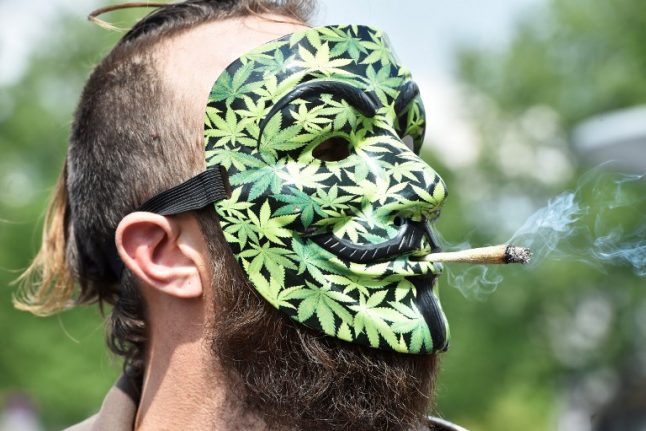
DRUGS
France looks set to soften its laws on smoking cannabis
France's fight against cannabis, through tough laws to punish users, has long been a failure -- the French remain among Europe's biggest dope smokers. So will a change of strategy under President Emmanuel Macron have more success?
Published: 23 January 2018 17:41 CET

People take part in a protest to support the legalisation of cannabis in Paris. Photo: AFP
And the new centrist government is preparing to soften legislation, making users caught with cannabis liable for an instant fine of €150-200 instead of prosecution and the threat of a one-year jail term.
Users currently also face fines of up to €3,750.
The change was an election campaign pledge from Macron last year, justified on the grounds that it would reduce the time spent by the police and judiciary on criminal cases involving recreational smokers.
The plan has been backed by a cross-party report for parliament, set to be unveiled on Wednesday, which rejects the idea of legalising the drug despite gains worldwide for a radical change in policy.
“At the moment we have procedures that complicate the lives of our police and court officials for not much in terms of results,” Christophe Castaner, the head of Macron’s Republic On The Move (LREM), said Monday.
He said there were 1.2 million regular users in France — higher than other estimates of around 700,000 which makes France one of the biggest consumers of the drug on the continent.
The smell of the pungent herb wafts through streets around the country, while Macron found himself in a cloud of ganja in the overseas French territory of Cayenne in October.
Posing for selfies with young people on a Friday night, the 40-year-old joked that “I’ve still got a nose for it… that will not help with your school work.”
Clarity and deterrence
A 2014 study by the French Observatory for Drug Use and Addiction (OFDT) found that 48 percent of 17-year-olds had tried the drug and nine percent were regular users.
Given its widespread consumption, French police have long given up bothering to arrest most people caught in possession of small quantities of the drug despite the mental health risks associated with heavy use, particularly in young people.
“A young person who gets caught smoking a joint knows that he or she risks nothing,” Castaner added in his interview on Monday with France Bleu radio.

Photo: AFP
Even when criminal procedures are launched — there are around 140,000 annually for drug possession — only 1,283 of them led to prison time for culprits in 2015, according to figures contained in the parliamentary report.
And the law is applied inconsistently, with prosecutors in northeastern Lille pressing charges against anyone caught in possession of more than 20 grams of cannabis, while the threshold is generally 50 grams in Paris, the report adds.
The on-the-spot fine scheme is intended to bring clarity and serve as a deterrent, with ministers and Macron all against following the worldwide trend towards decriminalising cannabis out of fear of normalising drug use.
“I’ll give you my personal conviction: we shouldn’t decriminalise cannabis, but on the other hand we need to face up to our failure,” Economy Minister Bruno Le Maire said at the weekend.
‘Not normalising cannabis’
In the United States, six states have begun producing and selling pot for recreational use, including California, while Canada is set to legalise hash in July this year.
In 2013, Uruguay became the first country in the world to completely legalise the production and sale of the drug, while in Europe, the Netherlands, Spain and the Czech Republic have laws tolerating personal use by adults.
One of the lawmakers who prepared the French parliamentary report, Eric Poulliat from Macron’s LREM, stressed to AFP that the fine “is not normalising cannabis or a step towards decriminalisation.”
Pro-legalisation lobby group Echo believes the French leader, elected last May, is missing an opportunity for more radical reform that would hurt dealers where it hurts — in their pockets.
“The regular cashflow for a dealer who sells several products comes from cannabis,” Benjamin Jeanroy from Echo told AFP. “If you take that away from them, then you’re hitting them financially.”
In a December 2014 study, the left-leaning think-tank Terra Nova calculated the possible tax gains from legalising and regulating cannabis at 2.0 billion euros a year for the state.
Url copied to clipboard!


 Please whitelist us to continue reading.
Please whitelist us to continue reading.